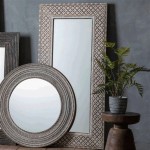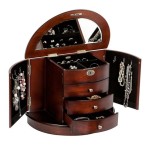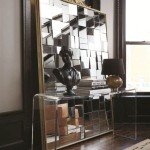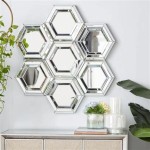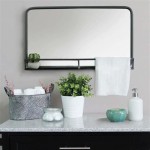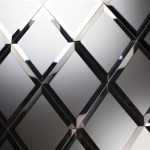Large Mirrors for Dining Area
A large mirror can dramatically transform a dining area, adding light, depth, and a touch of elegance. Selecting the right mirror involves considering size, shape, frame style, and placement to maximize its impact and complement the existing décor.
Key Considerations for Choosing a Large Dining Room Mirror
Several factors contribute to a successful mirror integration within a dining space. Careful planning ensures the mirror enhances the room's aesthetics and functionality.
Size and Scale
The size of the mirror should be proportional to the dining area and the furniture within it. An oversized mirror in a small room can feel overwhelming, while a small mirror in a large room might appear insignificant. A good rule of thumb is to choose a mirror that is slightly smaller than the dining table or sideboard above which it is hung. This creates a balanced and visually appealing arrangement.
Shape and Style
Mirror shapes range from classic rectangles and squares to more ornate ovals and circles. The shape should complement the overall style of the dining area. A rectangular mirror aligns well with a rectangular table, while a round or oval mirror can soften the lines of a more angular space. The frame style also plays a crucial role. A simple, minimalist frame suits contemporary settings, while an ornate, carved frame complements traditional or vintage aesthetics.
Placement and Reflection
Strategic placement maximizes the mirror's benefits. Positioning a mirror opposite a window reflects natural light, brightening the dining area and creating an illusion of spaciousness. Reflecting a beautiful piece of artwork or a well-curated vignette within the mirror adds visual interest and depth. Avoid placing the mirror where it reflects undesirable views or creates distracting glare.
Types of Large Mirrors for Dining Areas
Various types of large mirrors are available, each offering a unique aesthetic and functional value to the dining space. Understanding these types aids in selecting the perfect mirror.
Full-Length Mirrors
While traditionally used in bedrooms or entryways, a full-length mirror can add a dramatic and unexpected element to a dining area, particularly in smaller spaces where it can create an illusion of increased size. Leaning a full-length mirror against a wall provides a more casual and versatile approach compared to wall-mounted options.
Overmantel Mirrors
If the dining area features a fireplace or mantelpiece, an overmantel mirror serves as a stunning focal point. The mirror's size should be proportional to the mantel, leaving some space on either side for decorative accents. This placement elegantly combines functionality and aesthetics, reflecting light and adding a grand touch.
Statement Mirrors
Statement mirrors, often characterized by unique shapes, intricate frames, or unusual materials, serve as artistic centerpieces. These mirrors can significantly impact the dining area's style and become conversation starters. Care should be taken to ensure the statement mirror complements the existing décor without overpowering the space.
Decorating with Large Dining Room Mirrors
Integrating a large mirror effectively into the dining area involves thoughtful consideration of surrounding décor and lighting.
Wall Color and Texture
The wall color and texture surrounding the mirror influence its impact. A light-colored wall enhances the mirror's reflective qualities, while a darker wall creates a more dramatic contrast. Textured walls can add visual interest, but be mindful of the interplay between the texture and the mirror frame.
Lighting Considerations
Lighting plays a crucial role in maximizing a mirror's effect. Positioning the mirror to reflect natural light is ideal. Supplemental lighting, such as sconces flanking the mirror or a chandelier placed strategically above, enhances both the mirror and the overall ambiance of the dining area.
Accentuating with Decorative Elements
Decorative elements placed around the mirror further enhance its presence. Plants, candles, or small sculptures can create a visually appealing vignette. Balancing these elements on either side of the mirror maintains symmetry and visual harmony.
Maintenance and Care
Proper maintenance ensures the longevity and beauty of a large dining room mirror.
Cleaning Techniques
Regular cleaning prevents dust and grime from diminishing the mirror's reflective qualities. Using a soft, lint-free cloth and a gentle glass cleaner is recommended. Avoid abrasive cleaners that can scratch the mirror surface. For intricate frames, a soft brush can remove dust from crevices.
Protecting the Mirror Surface
Protecting the mirror from scratches and damage is essential. Avoid placing sharp objects directly against the mirror surface. Consider using protective backing for wall-mounted mirrors to prevent damage to both the mirror and the wall.
Frame Maintenance
The type of frame dictates the appropriate cleaning method. Wood frames may require periodic polishing or waxing, while metal frames can be cleaned with a damp cloth. Consult the manufacturer's instructions for specific care guidelines.
:strip_icc()/dining-room-mirror-ideas-14-proem-studio-agoura-hills-6923cf1fc7994523b3fff4414e723ca4.jpeg?strip=all)
17 Dining Room Mirror Ideas That Ll Dress Up Your Walls
:strip_icc()/dining-room-mirror-ideas-1-ashley-montgomery-b90b98cab74443e9ab4f9d5e9f6ac2d2.jpeg?strip=all)
17 Dining Room Mirror Ideas That Ll Dress Up Your Walls

Decorate Using Oversized Mirrors Mirror Dining Room Living Walls

Exquisite Wall Mirrors That Will Rock Your Dining Room Decor

The Best Dining Room Mirror Ideas Zhush

Transform Your Dining Room With A Mirror Decoholic

Mirrors In Dining Rooms 3 Do S And Don Ts You Should Know

Small Space Secret A Great Big Mirror

The Best Dining Room Mirror Ideas Zhush

Transform Your Dining Room With A Mirror Decoholic

